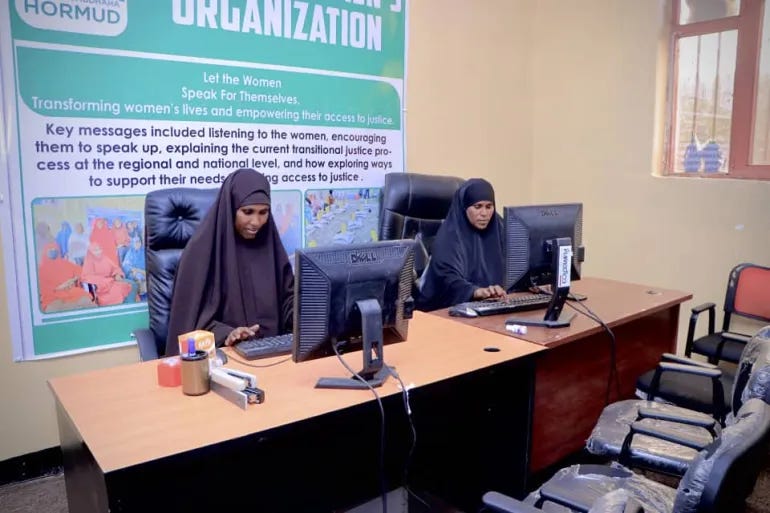Ethiopia’s Governance Crisis: Spotlight on Ogaden’s Forgotten Women Fighters
Bridging Federal Divides and Empowering Marginalized Communities
While Ethiopia’s conflict in Tigray dominated international headlines in recent years, other regions—such as the Ogaden (Somali) region—continue to grapple with the lasting impact of insurgencies and systemic neglect. A recent Al Jazeera feature (“Guns are silent but war lingers for Ogaden’s former women rebel fighters,” December 17, 2024) highlights the challenges faced by women ex-fighters who once took up arms against the Ethiopian government. Their plight speaks to deeper national governance issues, where peace agreements and constitutional provisions often fail to translate into meaningful social and economic reforms on the ground.
The Hormud Women’s Organisation is helping former women rebels [Photo: Al Jazeera]
As of January 2025, Ethiopia’s broader governance crisis—encompassing Tigray, Oromia, Afar, and Ogaden—remains a critical focal point for regional stability. Even though active hostilities in Tigray have waned, unresolved ethnic tensions, uneven development, and humanitarian concerns in other regions perpetuate cycles of disenfranchisement. Understanding Ogaden’s historical grievances and the ongoing struggles of women fighters underscores the need for holistic reforms that address not just the aftermath of war, but the inequalities that fuel conflict in the first place.
Current Dynamics: Beyond Tigray to Ogaden
Residual Conflict and Marginalization
Despite relative calm, many ex-fighters in Ogaden—particularly women—face ongoing discrimination, lack of economic opportunities, and limited access to trauma care. These everyday struggles underscore how formal peace deals often sideline comprehensive rehabilitation programs for former fighters.Humanitarian and Developmental Gap
According to reports, including Al Jazeera’s coverage, much of Ogaden’s rural populace still contends with limited health services, minimal infrastructure, and inadequate education. Donor attention has largely been directed toward northern Ethiopia (Tigray), leaving other marginalized regions with resource shortfalls.Evolving Regional Politics
Under Ethiopia’s ethnic federal system, the Ogaden (Somali) region has autonomy in principle, but actual power-sharing remains fraught. Like Tigray and Oromia, Ogaden’s relationship with the federal center in Addis Ababa continues to be shaped by complex political negotiations and historical mistrust.Women's Role in Peace and Reconciliation
The Al Jazeera article illustrates that women ex-fighters played significant roles both in armed struggles and in their communities post-conflict. Yet, they are often excluded from the very governance and policy-making processes that determine economic resources, social services, and reintegration efforts.
Key Governance Challenges
Inadequate Reintegration Frameworks
Reintegrating ex-fighters—women in particular—requires more than disarmament. It demands economic empowerment programs, psychosocial support, and community-driven reconciliation initiatives.Institutional Weaknesses
State institutions tasked with oversight and conflict resolution remain under-resourced. Political affiliations and ethnic divisions further dilute their effectiveness in addressing grievances from Ogaden to Tigray.Limited Transparency and Accountability
Allegations of past abuses by security forces and insurgents alike linger without formal closure. Failure to investigate and prosecute wrongdoing fuels cycles of distrust and potential renewed conflict.Regional Socio-Economic Disparities
Ogaden, like many peripheral regions, lags in infrastructure development, access to quality healthcare, and educational opportunities. This exacerbates local grievances against the federal center.
Policy Recommendations for Inclusive Governance
Localized Reintegration and Economic Empowerment
Dedicated Reintegration Programs: Establish specialized funds and training for former women fighters that address psychosocial needs, job placement, and entrepreneurial opportunities.
Microfinance and Cooperative Models: Support small-scale cooperatives, especially those led by women, to jumpstart local economies in conflict-affected areas.
Strengthening Federal-Regional Dialogue
Regional Consultative Forums: Bring together local leaders, ex-combatants, civic groups, and federal representatives to chart out region-specific development agendas.
Constitutional Guarantees: Ensure the Ethiopian constitution’s provisions for ethnic autonomy are enforced in practice, giving marginalized communities greater control over local governance.
Transitional Justice and Reconciliation
Truth Commissions: Launch regionally tailored truth-seeking initiatives, backed by independent bodies such as the African Union, to address historical grievances.
Trauma-Informed Peacebuilding: Partner with NGOs to provide gender-sensitive counseling and community-level reconciliation programs, ensuring women ex-fighters are not overlooked.
Enhanced Oversight and Accountability
Independent Investigations: Mandate transparent inquiries into human rights violations, including those highlighted by international media and local civil society.
Capacity Building: Bolster courts, anti-corruption units, and oversight agencies, ensuring they can operate independently of political pressures.
Equitable Humanitarian and Development Aid
Balanced Funding Allocations: Urge international donors to channel support into Ogaden, Oromia, and other underserved regions, not just post-conflict hotspots like Tigray.
Inclusive Infrastructure Development: Invest in roads, healthcare, and education facilities while employing local labor, thereby stimulating sustained regional growth.
Regional Impact: Security and Economic Interdependence
Ethiopia’s domestic policies resonate far beyond its borders. Regional trade, security alliances, and humanitarian issues in the Horn of Africa often hinge on Ethiopia’s stability. Ensuring that marginalized communities—like those in Ogaden—are not left behind is crucial. When governance gaps linger, they can incubate future insurgencies or spillover crises affecting neighboring Somalia, Djibouti, and Kenya.
Ethiopia’s governance crisis extends well beyond Tigray to other historically neglected regions like Ogaden, where the legacy of conflict continues to shape daily life—particularly for women ex-fighters. By prioritizing inclusive federalism, robust transitional justice, and equitable socio-economic reforms, Ethiopia can make strides in consolidating peace and stability. A sustainable resolution requires collaborative efforts—across local communities, federal policymakers, and international partners—to ensure that no region or group is left behind.
#Ethiopia #Ogaden #WomenInConflict #Governance #InclusivePolicy #HornOfAfrica #Peacebuilding #TransitionalJustice #AfricanGovernance #PolicyReforms #InclusiveDevelopment #PublicPolicy #TheIncusivePolicyDigest #AfricaPolicyDigest
For more in-depth analyses and to join a community dedicated to inclusive and transformative governance, subscribe to The Inclusive Policy Digest today.





